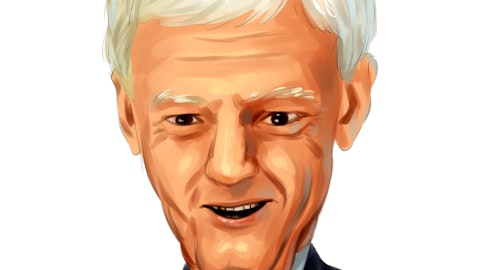We also had a number of customers, large scale customers that we’re contemplating fuel conversions to natural gas. And obviously, when you saw the market changes in the supply areas, moving the natural gas prices around creating some volatility that caused some customers to take a step back and think about what they were doing with their fuel toys. And so most all of that has now cleared up because that market hasn’t dropped back to where we’d like to see it, but the volatility seems to be moving out of it. So we have those kinds of issues that were affecting us, and it wasn’t so much us as it was a lot of issues for our customers trying to make choices and access vehicle products.
Chris Ellinghaus : That makes a lot…
Beth Cooper: I’m sorry. Because the only other thing I was going to add, and Jeff, if you want to add to this would be one of the things that we hope we will not see as many delays in would be in some of the regulatory reviews that our projects undertake. And so Chris, we’ve tried to think about that and look at that very carefully as we’ve set our CapEx guidance for this year, but our Southern expansion project, for example, took a lot longer than we originally expected. So we’re hoping in 2023, we don’t experience some of those regulatory and permitting delays that we did experience in 2022, but that’s, to me, something that there could be uncertainty around…
Jeff Householder: Yes, that’s an excellent point. And I think what you’ve seen us well, you haven’t seen it I’ll tell you what we are doing now is actually contemplating regulatory processes, especially at FERC, but also at the state level in many cases, that are just going to take longer than traditionally we’ve seen in the past. And so we’re beginning to build that in, obviously, to our forecast and projections of the timing on these projects and especially the timing of margins coming on.
Chris Ellinghaus : You guys have continued to have very strong customer growth. But with inflation, has this put you any closer to regulatory schedule changes in the northern territories?
Beth Cooper: We — Chris, we’re continuing, again, to see very strong customer growth in our northern service territory. But we are going to be required in Maryland as part of an acquisition that we did to actually go back into Maryland, and we’ll be approaching that on a consolidated basis, similar to what we did in Florida. In Delaware, certainly, we’ll monitor as we always do our earnings, our returns where they’re coming in. But to date, so far, you’ve seen us have strong customer growth that’s been able to sustain us without having to go in for rate cases on a routine basis. So we continue to evaluate it. So far, growth is strong, but we’ll keep monitoring it, and there always is the opportunity for us to go in at the appropriate time.
Operator: We’ll take our next question from Brian Russo with Sidoti & Company.
Brian Russo: Just to follow up on the regulatory strategy. You’re obviously pending the final order from the Florida PSC. It seems like all of the items that were approved back in January, specifically on cost of service. And I believe it’s a 13-month average forward 2020 test year. It seems as if you’re able to capture quite a bit of the inflationary pressures and the rising interest rates at your regulated segment. And could you just remind me what percentage of the overall rate base or the overall regulated segment Florida contributes? And then just a follow-up, when do you expect to file in Maryland?





